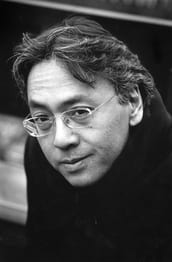One Day in the City: In conversation with Kazuo Ishiguro
By zclef78, on 4 July 2014
An unmissable event – UCL’s One Day in the City and Harper’s Bazaar came together to host John Mullan, head of UCL English Language & Literature and former Man Booker judge, in conversation with Kazuo Ishiguro in the packed Darwin Lecture Theatre.
The Booker Prize winning author was on form. In a day devoted to London in fiction, Ishiguro, or Ish, as he was called by John, announced “I came to explain why I don’t set my novels in London… I’m a bit anti-London.” Excellent start.
The conversation ranged extensively from settings in fiction to Ishiguro’s literary method, writers in London and the peccancy of political naivety in an author.
Ish established from the start the distinction between a novel’s setting and its world: “every novel should have a strong sense of its own world, whether it be severe, bizarre, dark or noire-ish… and the psychological and physical laws that operate in that world.”
The setting, meanwhile, has more to do with the public preconception of a place such as London, Paris in the 20s or New York in the 80s. He cautioned against the use of a setting without acknowledging its reverberations – what kind of noise it creates – adding wryly that “a writer who uses a setting like Nazi Germany without taking into account the Nazis is at best naïve.”
Ishiguro’s antagonistic relationship with settings began with his early novels A Pale View of the Hills (1982) and An Artist of the Floating World (1986). Westerners, knowing little about Japan, tended to take his novels too literally within the context of their Japanese setting. They assumed that he was trying to teach the reader about the Japanese mindset of the time.
You could sense his long-standing frustration as he elaborated: “I wasn’t a journalist trying to explain Japanese-ness to the West, I was trying to write a novel…what I thought were profound statements about the human condition.”
Even setting The Remains of a Day in England didn’t stop them; it just widened the area of specialist interest from Japanophiles to those with a singular interest in English butlers of the World War II era. His search for the “pure location”, it seems, continues.
John pointed out that Ish was one of the few leading contemporary novelists who had not used London as a setting. The conversation turned political as they debated the relative problems of using an ‘animal’ such as London, concluding that a place in London that can be anything is really nothing.
The formulaic paradigm of conspiracy thrillers illustrated Ish’s point. Their portrayal of a familiar London setting imbued with dark undertones creates frissons for the reader, “but,” he said “the very thing that gives you the thrill at the beginning bounces back on you by the end: you cannot credibly say that Nick Clegg or Michael Gove are actually orchestrating a serial killing.” The audience enjoyed that one.
Forced to write a novel set in London today, Ish claimed he would render it a right-wing monster, “a voracious greedy vampire, draining away the rest of an ailing social democracy clinging to the post-war ideals of a welfare state.” This gave John the opportunity to furnish us with the mandatory Jane Austen reference courtesy of Mary Crawford in Mansfield Park: ‘there was I, believing in my London maxim, everything is to be got for money.’
A writer in the city
The conversation shifted focus to London as the setting for the life of an author. As a resident of London himself, it came as a surprise when Ish revealed that he didn’t think it was necessarily a great place for writers. He “The real literary scene takes place in funny little rooms where writers sit by themselves for hours and try and write”, not the ‘London scene’ which is really the publishing scene. He was not one to frequent coffee houses, ganging up with other writers and becoming “terribly smug and superior”.
He suggested that this environment and the competitiveness it breeds is incompatible with the kind of self-exploration and excavation of your own voice that needs to be done in order to write fiction: “I am told French writers like to do this a lot, and possibly this is what has gone wrong in French literature.”
John countered with an anecdote straight out of the 17th century coffee houses of London where that kind of competitive environment produced such literary greats as Dryden and Alexander Pope. With performative flare, John recounted Dryden slamming down a volume of Paradise Lost composed in Cripplegate by the “weird, puritan Al-Qaeda kind of guy” and exclaiming ‘He has outdone us all!’, which turned out to support Ish’s point rather brilliantly, eliciting a large round of applause from the audience.
The question and answer session that rounded off the evening gave those seeking the secret to authorial success the opportunity to delve into Ish’s life and writing process. It turned out that this was a month spent holed up in an ex drug rehabilitation facility in Cornwall for the express purpose of teaching himself to write.
A relief to a large majority of budding novelists and hacks in attendance was Ish’s view that the rambling student scribblings, which Hanif Kureishi recently claimed indicated 99.9% of his creative writing students were untalented, were not necessarily predictions of future failure, citing the Radio play he once sent off to the BBC ‘Potatoes and Lovers’ with ‘potatoes’ spelt incorrectly.
He left us with the a parting message that “fiction is very much about this excavation of yourself… about finding your own voice, finding who you are, finding a world that really means something to you that you want to express.”
 Close
Close



